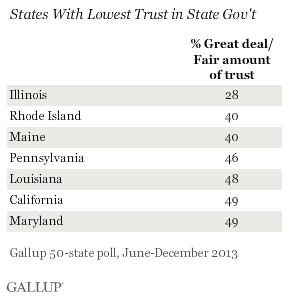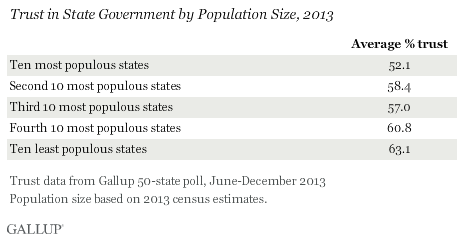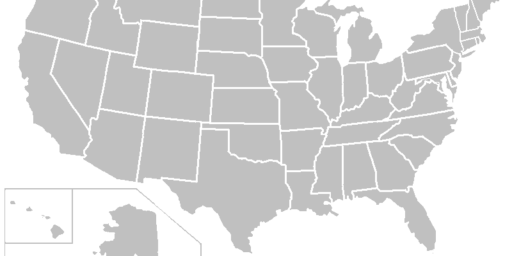Trust In State Government
A new poll finds that people in Illinois have an accurate assessment of politics in their state.
A new poll finds that people in Illinois have an accurate assessment of politics in their state.
Gallup (“Illinois Residents Least Trusting of Their State Government“):
Illinois residents trust their state government to handle their state’s problems far less than residents in any other state. Twenty-eight percent of Illinois residents trust their state government “a great deal” or “a fair amount.” In contrast, at least 75% of North Dakota, Wyoming, and Utah residents trust their state governments.
When I saw the headline, I guessed that Louisiana would be second. Turns out, they’re fifth.
I know little of the politics in Rhode Island and Maine but am somewhat surprised to see them so high on the list; unlike Illinois and Louisiana, I can’t recall a spate of high profile criminal malfeasance from officials there. Nor does it jibe with this, potentially specious, finding:
In general, trust is lower in more populous states than in less populous states. The 10 most populous states and 10 least populous states differ by 11 percentage points in state government trust, with the middle population states in between. Larger states have larger economies and more citizens needing services, and often more diverse populations, so they may be more challenging to govern than smaller states.
Maybe. But it’s quite possibly a specious, irrelevant finding. To the extent that population size alone—irrespective of diversity, geographic sprawl, and other issues that may be more explanatory—affects people’s trust in state government, we’d want to see correlation analysis. Simply breaking into neat groups of ten states is silly. California and Texas are massively larger than the other 48 states, making the delta within Group 1 larger than from the top of Group 2 and the bottom of Group 5. For that matter, while California is indeed in the group of states with the least trust, Texas is in the group with the most. I strongly suspect population size is a spurious metric.
The population size-trust relationship may help explain the finding that trust in state government tends to be higher in Republican-leaning states than Democratic-leaning ones, since larger states tend to be Democratic and smaller states Republican. Using Gallup’s 2013 data on state party affiliation, average trust in state government is 67% in solidly Republican or Republican-leaning states, 58% in competitive states, and 53% in solidly Democratic or Democratic-leaning states.2All of the 10 most populous states are either Democratic or competitive, according to Gallup’s party affiliation estimates. The most populous solid or leaning Republican state is Tennessee, which ranks 17th in population size. North Dakota, Wyoming, South Dakota, and Alaska rank among the top states in trust and the bottom states in population, and are all Republican-oriented states. Additionally, there are many other cultural, economic, and demographic factors that correlate with population size and politics that could help explain the trust-partisanship relationship.
Although Illinois’ exceptionally low trust level does bring down the averages for both Democratic states and most populous states, those groups of states would still rank lower than other states if Illinois were excluded.
Again, I’m dubious that party affiliation is the actual explanatory metric at work here, both because there’s no obvious reason it should be (indeed, Republicans would seemingly be ideologically disposed to distrust government, not Democrats) and because I’m suspicious of the coding. Texas, for example, is listed as “competitive” despite the fact that the governor, lieutenant governor, both US Senators, 23 of 36 US Representatives, and a majority of both houses of the state legislature are Republicans and the state last went in the Democratic column in a presidential election in 1976.









They should have asked me about Missouri. I trust them implicitly… To stick their head in the ground and pretend that everything is just blue skies and sunshine. The # of stupid laws with unintended consequences coming out of Jefferson City is the exact same # as laws passed.
Right on cue:
“On March 26, the Missouri Senate gave initial approval to Mr. Kraus’ Senate Bill 509, which would rob state revenue of about $620 million a year. Ironically, that’s about the same amount by which the state’s K-12 schools are underfunded.
The following day, the Center on Budget and Policy Priorities issued a report studying the Kansas tax cuts that Missouri is trying to emulate. Here’s what it concluded, based on the simple math of Kansas’ various economic indicators:
“States considering deep tax cuts in hopes of sparking a surge of economic growth should look carefully at Kansas. That state’s massive tax cuts have created a large and growing revenue loss and forced further cuts in funding for schools and other public services that the state had already cut because of the recession. The tax plan also has widened inequality and raised taxes on the lowest-income families. Finally, a year after the cuts first took effect, the state’s economy is not performing particularly well, and there’s no evidence to suggest that the tax cuts will cause the economy to take off in the years ahead.”
Missouri Republicans, of course, pointed out that the Center on Budget and Policy Priorities is a left-leaning think tank. So, even though math is politically neutral, they felt safe in ignoring the analysis. Missouri Republicans not only don’t trust science, they don’t trust math.
Sigh…
I think you have this wrong James. Republicans distrust government run by Democrats. They are actually quite trusting and unquestioning when their own team is in power. This holds at the state and national level.
Steve
@steve:
If you use Illinois as a counter, Democrats do not mind government they do not trust as long as they get their entitlements from the government. Illinois may be a state where most people do not trust the government but it is a one party state where Democrats gained seats in the last state election. Image what that means for the future when the Democrats cannot screw up enough to be voted out of office.
I’m not so surprised that my native commonwealth is in in fifth place. There was a scandal over unconstitutional legislative pay raises being passed in the middle of the night back in 2005 that some people still won’t stop crowing about. We’ve also had a few recent scandals like members of the General Assembly using their staff for campaigning, the Attorney General cancelling a corruption sting against legislators. A proposed ban on cash gifts has been the cause a great hubub recently.
I suppose that I should be happy that Pennsylvania isn’t in in the middle of the pack the way it usually is.
I tend to be very cynical about this, because seldom does the moaning I hear about corruption seem very well substantiated or informed. I sometime think that it’s just a way for people to feel like they’re clever and have a good handle on things by just writing the entire system of as horrible without needing to do much work to really establish that it is. It could also be a coping mechanism for feeling isolated or disaffected by changes in culture and politics that formerly followed the preferences of people like you, which would at least be plausible in Pennsylvania given its relatively large elderly population and declining rural population. Then again, maybe I’ve just been embittered by what I perceive as endless repetition and banality in how people talk about politics.
@superdestroyer: How much actual research have you actual done on dominant party states? I believe that it’s a pretty well studied phenomenon and that the research should be reasonably accessible with a little online effort.
I ask because you never seem to demonstrate any real knowledge or understanding of how they arise, develop and operate, yet you assume as a given inevitability of one in the United States that will be some some fantasy of conservative persecution and dystopia. Frankly, I can never even tell what your point is.
@superdestroyer- I guess the way I would look at it is that people vote for the policies they prefer. If you cannot tell which ones are the crooks, usually the case ahead of time, you may as well vote your policy preference. Even when it is known that a politician is a crook, there are plenty of times on both sides when voters still elect them. Rick Scott in Florida, Sanford in South Carolina come to mind for the GOP. The Dems have had stars like Jefferson and Barry. In Chicago and New Orleans you are probably best served by believing al politicians are crooks, then going on from there.
Steve
@Paludicola:
Considering I live and work in the Washington, DC metropolitan area, I get to see how a one party state operates, how it sustains itself, and how it is almost impossible to break. All one has to do is look at Chicago, Maryland, Mass., and now California to see how they arise and how they will maintain themselves.
If you look at Illinois, it is a high tax state where politics is a fight over getting things from the government and sticking others with the bill. That is how politics works in a one party state and it shows how the ruling class will maintain itself.
The reason that Illinoisans don’t trust their state government is not merely that they think that the politicians are crooks. I think that people who do not think that most politicians are crooks are just closing their eyes to a situation that they do not wish to acknowledge, as Harold Hill put it. The sad reality is that you can’t govern at the state or national level without making compromises, including to your principles and the law.
The problem in Illinois is that not only are our state politicians crooks, which we assume, but they are stupid (cf. Rod Blagojevich), aren’t even bothering to hide their misdeeds, and not delivering. It’s the combination that’s damning.
@steve:
A good Illinois example of voting for the crook you know would be the 2012 re-election of Jesse Jackson Jr. He was on a medical leave of absence at the time of the election and had been criminally indicted for a long list of felonies, Yet Rep. Jackson was re-elected with 63% of the vote. http://www.nbcchicago.com/blogs/ward-room/Jesse-Jackson-Jr-Wins-Reelection–175717941.html
What is amazing is the two previous holders of the same seat also left office due to personal indiscretions and corruption. After resigning office in 2013, Rep. Jackson was replaced, in a special election, by Robin Kelly, a fixer from Chicago, who will probably hold the House Seat until forced from office in a scandal.
Just because a government is corrupt, people will still vote for them. As the more money that a government has to pass around makes it easier for voters to tolerate the corruption. Of course, the real question for politics in the future is what happens when more than 50% of the voter will automatically vote for corruption.
@superdestroyer: “All one has to do is look at Chicago, Maryland, Mass., and now California to see how they arise and how they will maintain themselves.”
Ignoring for the moment that you seem unaware that Chicago is not a state, allow me to school you about California. This “one party state” for years elected Republican governors and senators. Then the California Republican party decided to adopt the principles of its fellows in Mississippi and Alabama, running on destroying goverment while sticking it to minorities. That led immediately to plummeting support for Republicans here, until the only thing they could do in a state where a supermajority of congress was required for a budget, was to destroy the state’s finances by refusing to sign on to a budget.
Finally the electorate had had enough and voted in a Democratic supermajority and a moderate Dem as governor. Since then, our budget is balanced, our debts are plunging, and the state is running well.
The only trouble is, ironically, that which comes from a “one party state” — a spate of corrupt Democratic legislators, which is what happens when one party has no competition. Unfortunately the California Repubs have no interest in moderating themselves to fit our state, or in governing.
The fact is if one party consists primarily of serious people who want to solve the state’s problems and the other is made up of howler monkeys flinging shit and swooning over Ted Cruz — yeah, one party is going to dominate.
Alternately, the real problem is icky brown people who want to steal your precious bodily fluids. I’m pretty sure I know which way you’ll come down on that.
@superdestroyer:
So how do you account for Louisiana?
Paging Ric Scott and Mark Sanford and Gov McDonnel. Ric Scott and Mark Sanford and McDonnel, please pick up any white discourtesy phone.
@superdestroyer:
So, none.
@superdestroyer: “A good Illinois example of voting for the crook you know would be the 2012 re-election of Jesse Jackson Jr”
But, who was running against him? The Republicans could have nominated someone who better matched the district, and would have been a plausible alternative, but they chose not to.
Just because someone has been indicted, is on drugs, that doesn’t mean the opponent is automatically better for the district. A little bit of graft and corruption can be less worse than someone implementing bad policy.
Rubes.
@OzarkHillbilly:
Oil money and its influence probably goes along way with explaining the corruption. Also, New Orleans had its own issues before Katrina.
I suspect that party and population of the state both play their roles. Huge generalizations here, but Republicans tend to be more trusting of GOP office holders and more distrusting of Democrats. Democrats tend to not put a whole lot of faith in either party, but they are less likely to simply assume that a Republican is dishonest and corrupt, even if they disagree with their policies.
States with smaller populations are likely to have more responsive government, though again there will be differences.
I also have to say that when I saw “California 49%” that struck me as about right. I trust the government of my state about 49%, and distrust it 51%. Trusting any government more than that seems to me to be an act of pure faith that is likely to be disappointed.
wr touches on the exact reason why SD’s DC model doesn’t scale. Like Republicans in California, Republicans in DC are handcuffed to a national party that gets its coalition based on national rather than regional factors. The GOP coalition is adequate in much of the country, and as long as it is that restricts the California GOP’s ability to maneuver even if it wanted to (though it could do more than it is). Once the national coalition is no longer viable, the model will likely change because it has to.
Or alternately, it will become so irrelevant that the various wings of the Democratic Party have no more need to stick together. Right now the biggest thing that the neoliberals and the left-left have in common is fear of a Republican majority. Once that fear dissipates, they can run against one another.
SD isn’t wrong that a worse case scenario does indeed involve conservatism being a label both party nominees run away from (like liberal has been). And that the “conservative” party might not be remotely conservative by today’s standards. But if that comes to pass and there is a Gray Party and a Fenty Party, the latter will still be considered “the right” at least rhetorically.
If you want to show that state size or diversity affects this score, you need a scatter graph.
FWIW, I’d say that the “cluster” that shows at 49% suggests that there won’t be a pattern in such a graph. After all, how alike are California and Maryland?
There are some significant outliers, but the pattern with regard to size and score is pretty apparent even without a scattergraph. It honestly doesn’t seem as strong to me as the partisan component, though, which they wave off with their curious methodology.
I’ve considered other factors such as diversity, partisan tilt (in either direction), wealth, but it mostly seems to come back to a combination of red/blue and size.
(My take on the red/blue is that most people are answering the question with the implicit question of “Compared to what?” being answered by “The federal government.” I wish they had included views towards trust of the national government as I bet there would be an inverse relationship. The fact that the president is a Democrat matters, though my guess is that only explains a part of the tilt.
@trumwill:
The Midwestern states are similar size, but split in a north south thing. Texas is even bigger and more southern, but acts like a smaller and more northern state.
Less pattern than anything simple.
Many low confidence states have the nations biggest cities, but some states break that rule too.
@trumwill:
If you look at the first and second place finishers of the DC Mayors race, there is little difference in policy. Muriel Bowser would be considered in the same faction as Gray. When you look at the election it is a classic one party state election where instead of issues it was about personalities, organization, and corruption. The thought that any part of the current Democrratic Party in DC would walk away to establish a new party an dlose the ability to get goodies from the city government is laughable. The same goes for Chicago.
@john personna: Assuming you mean the Great Plains, there is actually a pretty wide variance with the Dakotas having 725k and 850k , Nebraska with 1.8 million, and Kansas and Oklahoma with nearly three million and four million respectively.
The relationship isn’t perfect, but it’s there. The bottom quintile is higher than the second-from bottom, which is higher than the third from the bottom, all of which, along with the fourth, are higher than the top quinttile. Only the second (NJ-WI) and middle (MN-IA) are flipped (by 1.4% difference). Four of the five largest states are below-average, only two of the top twenty-five states is above-average. Four of the bottom five smallest states, six of the bottom 10, and eleven of the bottom half are above-average, compared to only six in the bottom 25 that are below-average. (numbers are by a quick count, I may be off by one or two on the top half and bottom half).
It’s a definite pattern. Not a perfect one (Hello Texas, Rhode Island!), but a pattern. I think there probably is some cause-and-effect, but there are numerous causes to the effect. And a lot of overlap between causes. It seems one of the more apparent of the lot, though.
Discussions like these are why I seem to always have my spreadsheet with the states and their populations out and handy…
@Trumwill:
This is why no one serious publishes half the data in a “relation” and calls it proved.
@Trumwill:
Rhode Island has a long history of being home to organized crime. Texas does not have the same history of organized, ethnically-organized crime. Remember the former mayor of Providence, Buddy Cianci, has done time in jail for corruption.
@john personna: Happy?
@superdestroyer: How did I know you would find a way to drag NO into LA corruption? Just couldn’t resist, could you?
@Trumwill:
Thank you. While the line has a slope, noise is very high.
The noise is high enough to make the population (actual or rank) not predictive.
(The least populous states show both the highest and the lowest confidence.)
@john personna: Yes, there are some extreme outliers (Rhode Island, Maine, and Texas specifically), but the trend withstands them. Lower population states tend towards high confidence, and vice versa, with outliers.
Looking at a graph done for partisanship now. As I suspected, the pattern is more noticeable with a little less noise, though it too has its outliers (like Louisiana and Hawaii).
Other factors swamp whatever influence state population or voting patterns have. (And, of course, there is some overlap in between state population and voting patterns.
@Trumwill:
Do we need to go to coefficient of correlation?
My eye says it is low.
@OzarkHillbilly:
Considering the current Mayor of New Orleans is the brother of one of the senators from Louisiana, why would anyone want to separate them. Also, I believe New Orleans has a long history of organized crime (the white ethnic kind).
@john personna: Yep, it’s low (.366), in big part (though not in all part) due to Texas, Indiana, Rhode Island, and Maine (without which it would be .610).
It’s not quite as weak for political persuasion (.53).
@Trumwill:
Instead of focusing on size, why not focus on overall taxes from a list such as http://money.cnn.com/pf/features/lists/total_taxes/
Maine has the second highest overall tax burden and Rhode Island has the sixth highest tax rate where as Indiana is 33 and Texas is 42nd.
@superdestroyer: a) That list is over 10 years old. b) It ignores the role that property taxes play in funding state and local governments.
The reason Maine is likely so high on the list is due to the current Governor, who is reviled by everyone who isn’t the most hardcore of Tea Partier. That includes the majority of Republican state legislators.
One of the fundamental differences between Republicans and Democrats that nobody seems to talk to is their disagreement on which levels of government you can trust the most. Republicans demonize federal government, and advocate devolving as much authority and control as possible to the state or (better still) local level. Democrats are latter-day Federalists, mistrusting local government and the “peculiar institutions” of the states, and preferring one law for everyone administered at the federal level.
I tend to side with the Democrats on this one, because I am cynical enough to believe that the Republican position is driven by a recognition that effective oversight and regulation are nearly impossible at the local level, lower-level politicians (and law enforcement) can be bought more cheaply, and corruption in state and local governments is less likely to attract unwanted attention. Also, large-scale redistribution of wealth of the kind that will foster ongoing economic growth and social justice must cross state lines, given the current wealth imbalance among states.
Also a lot of the sleaze here in Illinois is straight Chicago politics and the standard alderman-putting-his-relatives-on-the-payroll sort of thing. We’ve got several politicians trying to clean up matters but a lot of the old ways still hold.
@DrDaveT:
A very insightful post that ran off the rails with:
The cynical Republican response is that Democrats are invested in federal power because they believe that they can best impose their “we know best” agenda through massive populist bribes, appointing activist judges, and eliminating any pockets of resistance at the local and state level.
While both characterizations might actually be true of certain members of each party, I tend to think that most people are actually idealists who… gasp… actually believe that their preferred distribution of power delivers the best results for people within their communities (and beyond).
@mattbernius: I should perhaps have distinguished more clearly between Republican (or Democrat) party leaders, and Republican (or Democrat) masses. I was referring to party leadership, not voters.
I think you are correct about the Republican response, and indeed I think there is a lot of truth in that response. I just happen to also think that history shows we tend to do better under Democratic paternalism than under Republican robber barons. Especially lately, when the robber barons are (bizarrely) also the ones blowing up the debt.
But thank you for taking the time to clearly distinguish between the part of my comment you thought was insightful, and the part that wasn’t. I’m fine with that, since I’m not particularly happy with either Republicans or Democrats at the moment.
@superdestroyer: Using Tax Policy Center data from 2008 and 2007 (which is what I have handy) and comparing both state and local or just state only, I found extremely low correlations (.133 and .037). Shifting from tax burden as a portion of income to per-capita spending in dollar amounts did not help either (.097 and .012). Federal spending in a given state was also really low (.098).
Overall tax collection rates are actually less than entirely intuitive. Illinois and California, for example, are middling states.
@Trumwill:
Thanks for the analysis. I suspect that lack of trust in corruption is due to multiple factors and there are strong interactions between the factors. Maybe a high tax state along with few elected offices, and a history of organized crime can combine to have a synergistic effect.